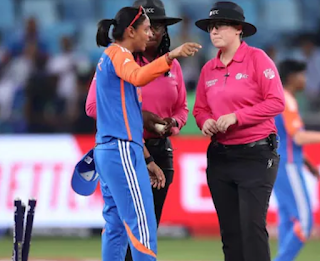In a gripping encounter at the Women's T20 World Cup 2024, held at the Dubai International Cricket Stadium, Indian skipper Harmanpreet Kaur and her teammates were left infuriated by a controversial decision made by the umpires regarding a run-out ruling during their match against New Zealand. The tension escalated on October 4 when, in a pivotal moment during the last ball of the 14th over, Amelia Kerr of New Zealand found herself in a precarious situation. Having scored 13 runs off 22 balls, Kerr was on her way back to the non-striker's end after attempting to take a second run on a single that she had initially secured off Deepti Sharma.
As the play unfolded, Kaur fielded the ball at long-off and made a strong throw that hit the stumps at the striker's end just as Kerr was returning. The Indian players erupted in celebration, believing they had successfully executed a run-out that would have seen Kerr depart the crease. However, the on-field umpires, Jacqueline Williams and Anna Harris, made a surprising and contentious decision to rule the ball 'dead' before the run-out could be officially recognized, thus allowing Kerr to remain at the crease. This decision sparked intense discussions and visible frustration among the Indian players, particularly Kaur and her opening partner, Smriti Mandhana, who was seen engaging in a heated debate with the umpires to contest the ruling.
The incident unfolded after Kerr had initially taken a single, and as she attempted to sneak a second run, New Zealand captain Sophie Devine sent her back. With the throw coming in quickly, Richa Ghosh broke the stumps at the striker's end, sending the Indian camp into jubilation. Yet, the umpires intervened, deciding that the ball had already become dead when Ghosh removed the bails. The delay in play and the subsequent discussions led by head coach Amol Mazumdar, who also voiced his concerns to the fourth umpire, added to the drama surrounding this pivotal moment in the match.
Commentators and analysts immediately began weighing in on the decision, questioning the timing and reasoning behind the umpire’s call. WV Raman, one of the match commentators, highlighted that the umpires seemed to have deemed the ball dead based on the fact that Deepti was being handed her cap at the end of the over, implying a moment of confusion regarding the status of play. This raised significant questions about the consistency and interpretation of the laws governing cricket, particularly in high-pressure scenarios where clarity is essential.
According to the relevant cricket laws, specifically Law 20.4, umpires have the authority to call a ball dead under various circumstances, such as instances of unfair play, potential injury, or even when there’s a delay that may affect the continuation of play. The complexity of these laws has often been debated in the cricketing community, especially when crucial decisions like these can dramatically influence the course of a match and the morale of the players involved.
Despite the unexpected reprieve, Amelia Kerr's luck did not hold, as she ultimately succumbed to pressure and was dismissed shortly after the incident. Renuka Singh, who had been performing strongly throughout the innings, managed to catch Kerr out at extra cover, thereby concluding her innings at just 13 runs. This dismissal was critical, as Kerr had previously formed a partnership of 32 runs with Devine, which was essential in stabilizing the New Zealand innings amidst a fluctuating batting performance.
The implications of this controversial decision extend beyond the individual match; it raises significant concerns about the overall standards of umpiring in high-stakes competitions like the Women’s T20 World Cup. As cricket continues to grow in popularity and competitiveness, especially in women’s sports, maintaining a high standard of officiating is paramount to ensure fairness and integrity within the game.
This incident has sparked widespread discussions in cricket circles and among fans regarding the necessity for better training and education for umpires, particularly in high-pressure situations. The stakes are immensely high in tournaments of this caliber, where teams invest substantial effort, resources, and hopes in pursuit of victory. Clear and consistent umpiring not only upholds the spirit of the game but also fosters trust among teams and their supporters.
As the tournament progresses, all eyes will be on the officiating crew to ensure that such contentious decisions do not overshadow the skills and sportsmanship displayed on the field. The passionate reactions from the Indian team and the subsequent discussions around the incident highlight the emotional intensity that surrounds competitive cricket, particularly during major international tournaments. This incident is a poignant reminder of the fine margins that can dictate the outcome of a match and the deep-rooted passion that both players and fans bring to the sport. As teams continue to battle it out in the Women’s T20 World Cup, it remains crucial that the focus stays on the players' performances while ensuring that the integrity of the game is upheld through fair and just officiating.



